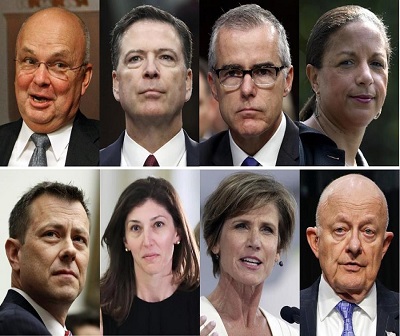FBI Intel Chief Admits Hillary Clinton Emails Discovered in the Obama White House
A top public-interest legal firm has informed the nation that an upper-echelon FBI official admitted -- both in written statements and under oath -- that the agency found Hillary Clinton email records in the Obama White House, specifically, the Executive Office of the President.

The FBI official also conceded that nearly 49,000 so-called Clinton-private server emails were reviewed as result of a search warrant for her material on the laptop of former Congressman (D-NY) Anthony Weiner, husband of Clinton lackey Huma Abidin.
FBI Assistant Director E.W. (Bill) Priestap of the ultra-sensitive and secretive Counterintelligence Division revealed to officials at the prolific and far-reaching legal group Judicial Watch as part of a order allowing JW attorneys access to the Clinton email from an unauthorized Internet server hidden in her home in a New York suburb.
Federal District Court Judge Royce Lamberth ordered the Obama administration’s senior State Department officials, lawyers, and Clinton aides, as well as Priestap, to be deposed or answer writer questions under oath. Judge Lamberth noted on the bench that the Clinton email system was “one of the gravest modern offenses to government transparency.”
The FBI’s Priestap was requested by the federal judge to allow Judicial Watch access to identify representatives of Hillary Clinton, her former staff, and government agencies from which “email repositories were obtained.” Priestap responded with the following non-exhaustive list:
- Bryan Pagliano
- Cheryl Mills
- Executive Office of the President
- Heather Samuelson
- Jacob Sullivan
- Justin Cooper
- United States Department of State
- United States Secret Service
- Williams & Connolly LLP
Priestap is also on the record for his testimony that 48,982 emails were subject to JW attorneys’ review as a result of a warrant for Clinton email account information from the laptop of Anthony Weiner, who had been married to top Clinton aide Huma Abedin. Weiner, a former U.S. Congressman from New York, had been exposed as an Internet sexual predator by the New York City Police Department. His attempted run for mayor of New York City met with disaster.
“I’ve always considered Weiner an odd-duck and an immodest political hack. In fact, most of the cops I worked with thought he was a devious and deceitful politician. We were glad to see him fall from the grace of the Democrats and socialists who supported him,” said Iris Aquino, a retired police officer.

Priestap helped oversee both the Clinton email probe and the 2016 presidential campaign investigation. Priestap testified in a separate lawsuit that Clinton was the subject of a grand jury investigation related to her BlackBerry email accounts.
“This astonishing confirmation, made under oath by the FBI, shows that the Obama FBI had to go to President Obama’s White House office to find emails that Hillary Clinton tried to destroy or hide from the American people.” said Judicial Watch President Tom Fitton.
“No wonder Hillary Clinton has thus far skated – Barack Obama is implicated in her email scheme,” Fitton quipped in his emailed statement.
Priestap was ordered to answer the written questions by United States District Court Judge Royce C. Lamberth when he ruled in January that Judicial Watch’s discovery could begin in Hillary Clinton’s email scandal. This action came in Judicial Watch’s July 2014 FOIA lawsuit for:
1.Copies of any updates and/or talking points given to Ambassador Rice by the White House or any federal agency concerning, regarding, or related to the September 11, 2012 attack on the U.S. consulate in Benghazi, Libya.
2. Any and all records or communications concerning, regarding, or relating to talking points or updates on the Benghazi attack given to Ambassador Rice by the White House or any federal agency.
Judicial Watch’s discovery seeks answers to:
- Whether Clinton intentionally attempted to evade the Freedom of Information Act (FOIA) by using a non-government email system;
- whether the State Department’s efforts to settle this case beginning in late 2014 amounted to bad faith; and
- whether the State Department adequately searched for records responsive to Judicial Watch’s FOIA request.


